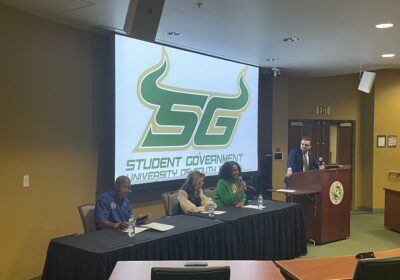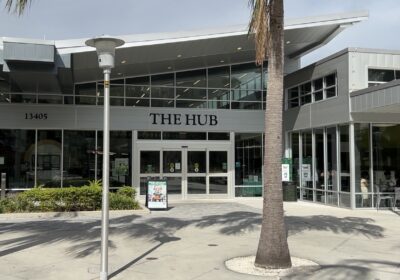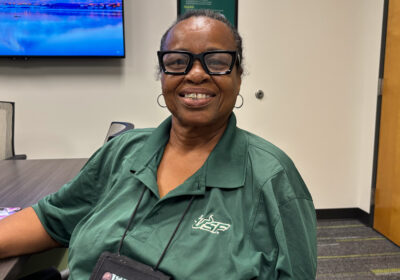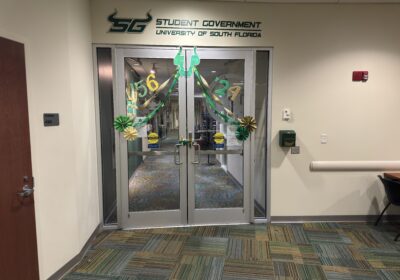Face masks, social distancing violations at USF prompt enforcement
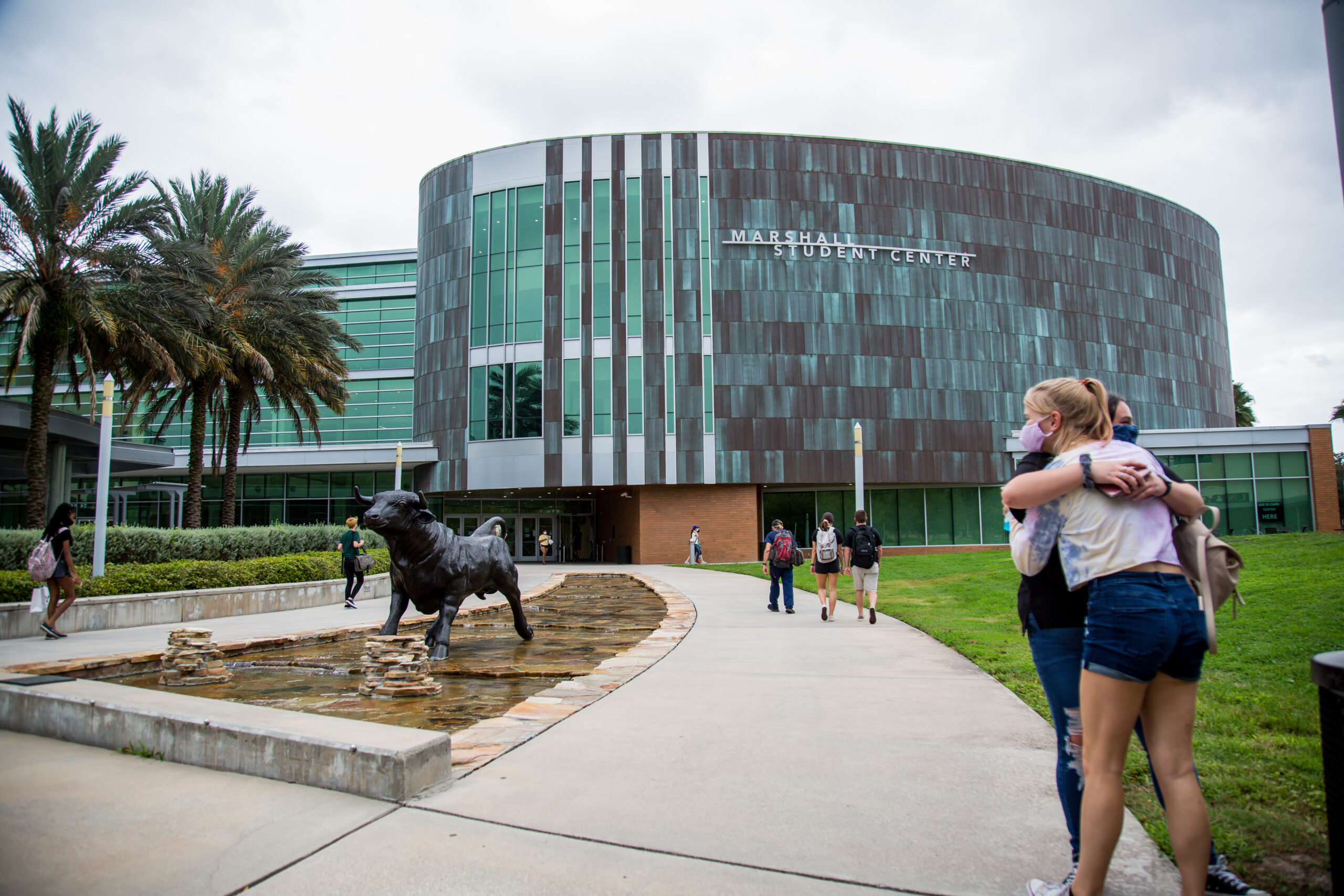
As the fall semester unfolds and students adapt to USF’s new safety protocols, violations of the Student Code of Conduct have been reported around campus regarding the use of face coverings and the 6-foot physical distancing guidelines since the start of classes.
From assigning staff to breakout group gatherings to reporting violations of the Student Code of Conduct, the Student Conduct and Ethical Development Office has been enforcing the university’s guidelines around campus, including the mandatory use of face masks and physical distancing, to mitigate the spread of COVID-19.
Students who don’t comply with university policies may be removed from the activity or campus and may face disciplinary action through the university’s student conduct process, according to USF Spokesperson Adam Freeman.
While there has been compliance with the use of masks for the most part, Dean of Students Danielle McDonald said the biggest challenge is enforcing the physical distancing guidelines around campus.
“We are seeing some issues with the 6-feet distancing when people are with other people,” McDonald said. “It’s the mask and the distancing that controls the spread, it’s not just the mask, it’s not just distancing. It’s got to be both.
“That’s what we are having to remind people about, because the nature of everybody is that we want to be with each other, and we’ve missed each other since March. So while it’s understandable, it can’t continue. We will have more people testing positive and spreading it to each other if we don’t.”
Freeman said about 40,000 people responded to the Return to Campus COVID-19 Assessment that they intend to return to a USF campus on a regular or periodic basis during the fall semester. All students who intend to visit campus are required to fill out the USF Daily Symptom Tracker to receive clearance.
As referrals are reported to the Student Conduct and Ethical Development Office and students are identified, Director of Student Conduct and Ethical Development Melissa Graham said the office is taking an educational approach to tackle the violations.
“We truly are trying to take an educational approach, we know that this is new and different for everybody,” Graham said. “Having those conversations up front and making sure those individuals know why this is important [and] why they’re coming to our office and having this meeting. If the behavior continues to persist and we continue to see the same individuals in our office, obviously, that conversation can change so it can go through processing through the Code of Conduct and actually being charged with a conduct violation, which could potentially result in sanctions from our process.”
If students are consistently noncompliant with the university’s protocols, including the use of face masks and physical distancing, then their cases will move through the conduct process, according to Graham. Students can either be subject to an educational conversation, potential suspension or even expulsion from the university for not following the community guidelines.
“Depending on the level of severity, that could go all the way from a warning to provisional suspension and then suspension, because it is a health and safety violation of our community,” McDonald said.
“Our first approach is going to be reminding and educating and then after that, we’re going to be holding [students] accountable with our Student Code of Conduct.”
To report a violation of the Student Code of Conduct, students must fill out a form on the Office of Student Conduct and Ethical Development’s website containing specific information regarding the violation. Students can also upload any supporting documentation, including pictures, in the form.
Students are encouraged to be as detailed as possible when filling out the form by including the name of the violator, the date, time and location of the violation, as well as any additional information pertaining to the incident.
Students may submit an anonymous referral, but Graham said students need to report a name in order for the Student Code of Conduct process to move forward.
“We have had reports of individuals where they’ve taken pictures, but we don’t know who that individual is, we don’t know where they’re at, so there’s no way that we can follow up,” Graham said. “In order for somebody to move through either an educational conversation … or potentially through the Code of Conduct, we have to know who that individual is.”
If the Office of Student Conduct and Ethical Development does not have enough information on a student violating the university’s policies, McDonald said the office would still analyze the referrals to analyze patterns and hot spots with the highest activity on campus.
“We just start looking at where this is happening, quite often we need to position some staff to be able to confront and remind people about this,” McDonald said. “If we can’t hold the individuals responsible for it, then what we’ll do is look at patterns so that we know where we should start providing more education and more of a response.”
To enforce the university’s policies, McDonald said staff from the Office of Student Success as well as from Housing and Residential Education have been assigned to patrol the hot spot areas around campus, including the Hub, the Marshall Student Center and residence halls, where most group gatherings were recorded in the past week.
“We are going to have staff that is roaming around this weekend and in the evenings because that’s where we’re seeing it for the most part, and we’ll be confronting it, and breaking them up and helping people understand that they can’t be doing that,” McDonald said.
McDonald said staff will do rounds around campus in pairs. The number of staff assigned could depend on the number of group gatherings being reported.
“We’re continuing to ensure the health and safety of our community and reminding people what the policies and the guidelines are,” McDonald said. “The number of people that we meet will depend on, you know, how these groups start forming. Over the next couple of weeks, students are going to get more comfortable, they’re going to meet more people. And so we may need more people. My hope is that if we can set the expectation now, students will learn.”
Students who see others violating the university’s protocols around campus should reach out to a staff member or faculty to better address the issue, according to Graham.
“If they’re in the [Marshall Student Center], we recommend finding a staff member or if they’re in their residential facility, finding a [resident assistant] or something along those lines,” Graham said. “We cannot process something unless we have the name of the individual.”
McDonald said the Office of Student Success received two reports in the past week, but both turned out to be “false.”
“One person had posted on social media for people to drop their Snapchat, and to link up together, and she just meant virtually link up together, and she did not mean to be hosting a party. So that one was false and right away we talked with her about that,” McDonald said. “And another one was somebody had created a flyer and posted it, and that it was about a fraternity and that was quickly taken down and was found to be false as well.”
If a student doesn’t comply with the Student Code of Conduct or an incident is taking place off campus, McDonald said the University Police (UP) could get involved.
“The police would come out and they would try to just break it up because really that’s the most important thing, it’s not so much about whether people get in trouble or not, it’s that we need the behavior to stop,” McDonald said.
“And so they would break it up and if people were disobedient with that or were to cause issues, they would have to take whatever next step they need to take. And at that point, it’s not because of the grouping it’s because of their reaction to enforcement and failing to comply with orders so they could arrest people, or they could take the information and then send them to Student Conduct.”
UP responded to two reports on Aug. 27 of a “large group of people not social distancing or wearing masks” inside the Greek Village, at USF Birch Drive, according to Administration Bureau Commander Meg Ross.
Upon arrival the group could not be located. Ross said in an email to The Oracle that there weren’t any calls off campus.
While the university’s policies do not designate off-campus gatherings, Graham said the Office of Student Conduct and Ethical Development Office would engage in conversations with the individuals regarding maintaining the health and safety of the community.
As of Tuesday, USF had reported more than 250 COVID-19 cases since March. During the first week of the fall semester, about 17 students in the Tampa campus tested positive for COVID-19, while both the St. Pete and Sarasota-Manatee campuses reported one case each.
For McDonald, her biggest concern at the moment is making sure students are maintaining a 6-foot distance from each other as well as following all university protocols to mitigate the risks of contracting COVID-19.
“Everybody’s learning that we have to let go of something, that while we want to make things feel as normal as possible, it’s not a normal time,” McDonald said. “And we want to be a lot more strict right now with how we take care of this community so that hopefully we’re able to loosen up later. But if things spread, or we’re finding widespread noncompliance, [and] we’re concerned about safety, then we can’t loosen up our restrictions later, they will have to get more and more strict.”

